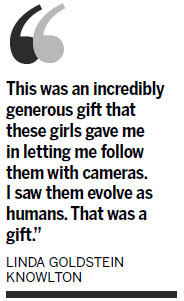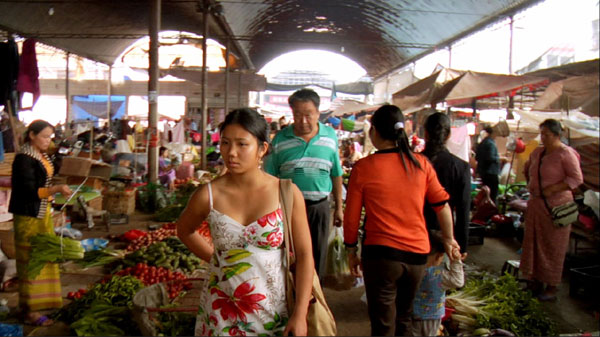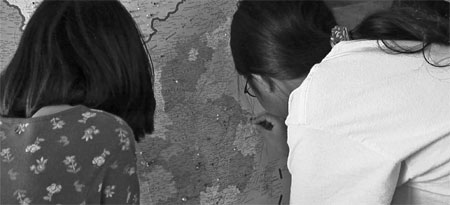Living 'in-between' is deeply personal
Updated: 2012-10-12 12:19
By Kelly Chung Dawson in New York (China Daily)
|
||||||||
|
Fang "Jenni" Lee walks through a market in Yunnan province, China, in a scene from Somewhere Between, a documentary by Linda Goldstein Knowlton about the lives of four female adoptees. Provided to China Daily |
About 80,000 girls from China have been adopted by American parents since 1989, according to the US State Department. Many are now in or entering their late teens, grappling with the same issues of identity that affect all adolescents - but often with the added obstacle of not knowing their own background or, in some cases, true age.
Somewhere Between, a new documentary by filmmaker Linda Goldstein Knowlton (The World According to Sesame Street), focuses on four such girls: Jenna Cook, Haley Butler, Ann Boccuti and Fang "Jenni" Lee.
Scattered around the US in Massachusetts, Tennessee, Pennsylvania and California, the adoptees are in most respects typical American girls with loving, middle-class families. What they share is an arguably universal feeling of not truly belonging, of floating in between worlds as they struggle to place themselves.
Goldstein is herself mother to a now-7-year-old Chinese adoptee, Ruby, who makes brief appearances at the beginning and end of the film. Somewhere Between is dedicated to answering questions Ruby will inevitably have when she becomes a teenager, Knowlton said.

"I made this movie for her," Knowlton told China Daily. "Growing up, no matter who you are and who your family is, adolescence is a time when you're trying on all different parts of your identity. You want to fit in, and you also want to stand out. I thought to myself, 'How is that going to affect my daughter, and what can I do to help her when she gets there?'
"There are thousands of teenage girls who were adopted from China - why not go talk to the pros?"
After finding the girls through various Chinese-adoptee groups, Knowlton followed them for three years, filming them at home, at school and with friends and family.
"This was an incredibly generous gift that these girls gave me in letting me follow them with cameras," she said. "I saw them evolve as humans. That was a gift."
Cook, 20, who received coverage in Chinese media this summer for an ultimately unsuccessful effort to find her birth parents, said that the experience of being on camera was a constant evolution.
"Between the ages of 15 and 20, you're developing as a human being," she said. "As a 15-year-old, I was shocked that someone actually wanted to hear what I had to say. It was an empowering platform.
"But then there were times we talked about difficult issues like abandonment, loneliness or being an outsider, and that was hard. I felt lonely and sad, and you see that sometimes in the film. But I think that if you look at the bigger picture, the purpose of the film is to help others feel less lonely, to feel a shared commonality - so that temporary loneliness was worth it."
In an interview with CCTV this summer, Cook said she felt grateful to her birth parents and had no wish to disturb them.
|
Two girls identify parts of China on a map in a scene from Somewhere Between, Linda Goldstein Knowlton's 2012 documentary about the lives of four girls, now young adults, who were adopted from China by American parents. Provided to China Daily |
"They gave life to me," she said. "I will never forget them, and just want to give them my love."
Cook's account on Weibo has 96,000 followers; her first message about the search for her birth parents received over 28,000 comments. But ultimately her search yielded no answers. She plans to write about the experience, she told China Daily.
In the documentary, several of the girls jokingly refer to themselves as "bananas" and "Twinkies" -yellow on the outside, white on the inside. Others feel a stronger pull to China. In a somewhat awkward but moving scene, Butler is reunited with her birth family. Her adoptive mother asks: "We want to know: Who abandoned her?"
Lee comforts a longtime friend, a little girl with cerebral palsy, as she breaks down upon being handed over to her new American family. Boccuti wonders occasionally about her birth family, but doesn't dwell on it.
"What became clear to me was that there was no one way to have this experience of being adopted or of being a young woman of color in the US," Knowlton said.
Cook expressed similar sentiments.
"I still believe it's a very personal choice, and I don't think there is any right or wrong age to search for your parents," she said.
"As an adoptee, it's exciting for me that there are more and more forums today to talk about these issues and the diversity of ways people have approached this challenge."
Both adoptees and non-adoptees have reacted emotionally to the film, Knowlton said.
"I've heard from countless first-, second- and third-generation Asian-Americans that they related to these girls' experiences," she said.
"They feel in between how their parents want them to live their lives, and how they are living their lives."
At one screening, a man who had moved from China to the US at age 25 said Somewhere Between was his story; at another screening, a Caucasian man in his 50s said the story resonated deeply in relation to his own search for identity and his attempts to understand his family.
"These are the universal themes in human experience," Knowlton said. "These are the layers that people can relate to."
Cook's greatest hope is that other Chinese adoptees will take comfort in the film.
"Whether it helps to make them feel less alone, or inspires them to think about these issues for the first time, I just hope they see it and they can disagree, or agree, or laugh at some parts, and cry at others. The ultimate goal of the film is to simply be a discussion-starter. Even though it homes in on the lives of us four girls, it's not about us. It's about much larger issues."
The film illustrated something that Knowlton knew intellectually but hadn't fully understood.
"As a parent, all you want to do is protect your child, and you can't entirely," she said. "All you can do is find ways of helping them through troubled times. At least I know we can be in it together, a wide range of people who have had this experience.
"Sometimes we're in-between - but that's OK, because we'll always make it to the next shore."
kdawson@chinadailyusa.com
(China Daily 10/12/2012 page11)

 Relief reaches isolated village
Relief reaches isolated village
 Rainfall poses new threats to quake-hit region
Rainfall poses new threats to quake-hit region
 Funerals begin for Boston bombing victims
Funerals begin for Boston bombing victims
 Quake takeaway from China's Air Force
Quake takeaway from China's Air Force
 Obama celebrates young inventors at science fair
Obama celebrates young inventors at science fair
 Earth Day marked around the world
Earth Day marked around the world
 Volunteer team helping students find sense of normalcy
Volunteer team helping students find sense of normalcy
 Ethnic groups quick to join rescue efforts
Ethnic groups quick to join rescue efforts
Most Viewed
Editor's Picks

|

|

|

|

|

|
Today's Top News
Health new priority for quake zone
Xi meets US top military officer
Japan's boats driven out of Diaoyu
China mulls online shopping legislation
Bird flu death toll rises to 22
Putin appoints new ambassador to China
Japanese ships blocked from Diaoyu Islands
Inspired by Guan, more Chinese pick up golf
US Weekly

|

|








